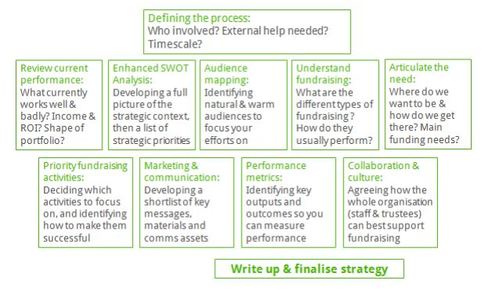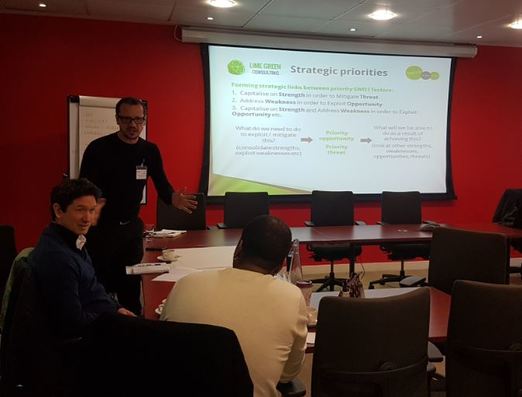 “Have you got a good template for developing our fundraising strategy?” This is one of the most common questions we're asked, but one that we don’t have a very helpful answer for. Which is another way of saying that our stock answer is “No”. There’s a very deliberate reason for this. A fundraising strategy template puts the emphasis on writing – it fuels the common myth that your fundraising strategy can be written by someone in isolation, with just a handy structure to help pull out and shape the information in their head. But I’ve seen plenty of beautifully written fundraising strategies that ended up in the bin or a dusty drawer within six months. Writing isn’t the most important part of creating a fundraising strategy – it’s talking. To create a really good strategy, first you need to assemble the key people who understand your organisation and your previous fundraising efforts. Then you need to discuss your key opportunities and challenges, and make difficult decisions about how to use your limited resources. This is why, instead of a fundraising strategy template, we have a series of exercises and processes that we can help you work through to arrive at some key decisions and conclusions. Yes, we can ultimately help you to write up those decisions and conclusions in a structured way, but – cheesy as it sounds – our emphasis is on the journey as much as the destination. Of course, just saying "No, you can't have a template - go away and do loads of work instead" feels a bit mean. So here are a few reasons why developing your strategy needs to be a collaborative process, and what to focus on: No one person has all the right answers Even in a very small organisation, it takes more than one person to create a great fundraising strategy. You’ll benefit from involving your wider fundraising team, project staff, trustees, even key volunteers, supporters or donors. Often these people won’t have the right answers either, but they can ask the right questions to help you get there. Sometimes they’ll even have the wrong answers, but a successful strategy relies on bringing them along for the journey (more on that shortly). Of course, involving lots of people in the process can feel unnerving – what if certain voices dominate the discussion, or nobody has anything to say and there’s an awkward silence? When we support an organisation to develop their strategy, we work through a series of processes and structured exercises to help everybody contribute objectively to piecing everything together. This includes:
You need to debate, make and document difficult decisions Some organisations mistakenly think that creating a fundraising strategy involves listing out all the conceivable types of fundraising you could do, with an action plan and an income target for every area. The big issue here is assuming that you have the resources to do everything, and that all types of fundraising are equally valuable. For smaller organisations, this usually results in spreading yourself too thin, and doing many things badly rather than a few things well. Even for bigger organisations with capacity to try everything, it still ignores the reality that spending twice as long on Activity A might be better than doing equal amounts of A and B. So Challenge #1: Making Difficult Decisions. If we focus on an individual giving programme rather than trying to do an annual event too, can we expect a better return? Do we need to prioritise some quick wins from trusts and foundations in Year 1 to safeguard our key service activities, before we try to tackle corporate fundraising? It takes more than one person to answer these questions – you need a collaborative process, built on the processes and exercises described above. That still leaves Challenge #2: Documenting Difficult Decisions. What if you’ve decided to discount a type of fundraising that some of your staff enjoy and have good previous experience with? What if a new trustee joins tomorrow who loves major donor fundraising, and can’t understand why you’re not doing it? A good fundraising strategy doesn’t just explain what decisions you’ve made, but why. Crucially, this applies just as much to the things you don't do. There are plenty of legitimate reasons for deciding not to do certain types of fundraising – for example we don’t have the right expertise, the organisation isn’t ready, it’s too risky. Documenting these choices builds confidence in your strategy, and makes it less likely that people will challenge it in the near future. Fundraising success depends on the whole organisation
Successful fundraising requires a lot more than a good fundraising team – management need to know how to support your efforts and set realistic targets, project staff need to provide the right information to help you write convincing proposals and report back on grants, and you’ll need cooperation and a joined-up message across your social media, newsletter and at events. However, all staff are busy and they’re not going to drop everything to prioritise fundraising, particularly if they don’t understand the significance. So taking a collaborative approach to developing your fundraising strategy – and involving the wider team – helps people to appreciate any challenges that are blocking successful fundraising, and the often small things they can do to make a big difference. Creating a fundraising strategy is a dynamic and different process for every organisation We’ve successfully helped dozens of charities and social enterprises to create their fundraising strategy, but it’s never been exactly the same process twice. Depending on your focus and circumstances, you’ll need to do bespoke bits of extra work. This could include anything from analysing why you keep losing out to similar organisations for key grants, segmenting your database to analyse how many people are donating at different levels, or creating an ethical fundraising policy to help you decide when to accept – or reject – donations from companies. If you involve a broader range of people in developing your fundraising strategy, you have more chance of identifying any weak spots where you need to do extra work, then getting everyone on board to fix them. This is another reason why a fundraising strategy template is misleading – because it implies that every organisation can just work through the same content, whereas in reality everyone’s circumstances are different. For more info on how we help organisations to develop their fundraising strategy, click here. Alternatively, check out our fundraising strategy training courses and free resources.
0 Comments
Leave a Reply. |
Like this blog? If so then please...
Categories
All
Archive
May 2024
|
Lime Green Consulting is the trading name of Lime Green Consulting & Training Ltd (registered company number 12056332)



 RSS Feed
RSS Feed